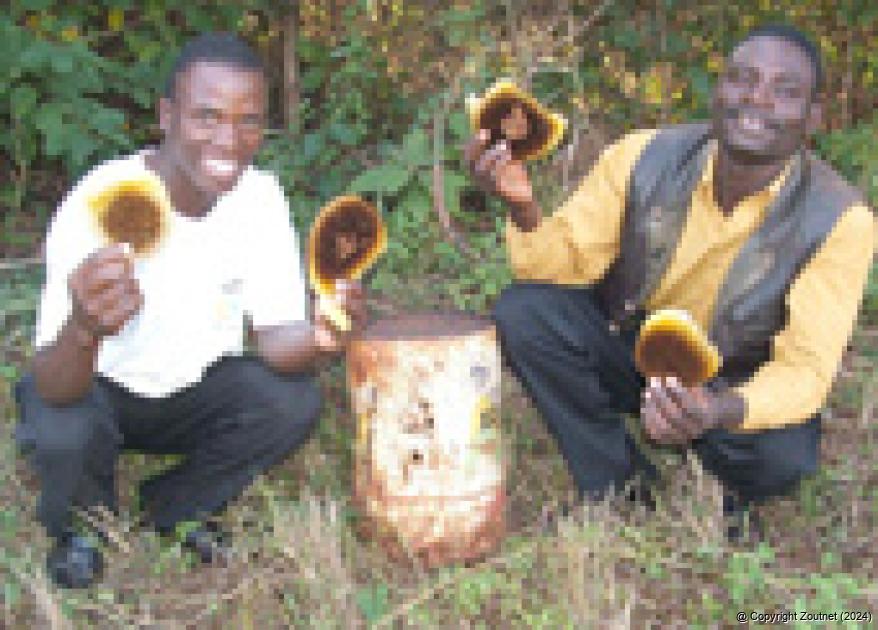
Vhutshilo Ndou (left) and Mashudu Mudau have found new life in traditional beekeepping. The old tin is one of their 33 beehives in their little orchard at Phiphidi.
News - Date: 29 July 2005
PHIPHIDI – Many people will never go closer to bees because they regard the bees as dangerous insects that can easily harm them or take their lives, but to Mashudu Mudau (25), Vhutshilo Ndou (21) and Elias Mudau (52), bees are friends who provide them with honey, comfort and peace of mind.
Although they do not have any formal beekeeping training, the trio came together in 1994 to start a traditional beekeeping venture in Phiphidi-Ndondola, a rural village west of Sibasa. It all started with only one hive made of an old clay pot, but today they boast 33 traditional beehives, made of old tins, discarded concrete pipes and thatched grass, in their small orchard.
The trio have proven that it is possible to achieve goals without proper infrastructure and finance.
Mashudu is a computer teacher at the local John Marubini Primary School and Vhutshilo is a third-year BCom Accounting student at the University of Venda. Elias is a security guard, but the three still squeeze their tight schedules to conduct their beekeeping activities.
The mastermind behind the initiative, Mashudu, explains how they got started: “We used to go to the local mountain to fetch honey several times. One day when we were fetching the honey, I told my counterparts that we could produce our own, but they initially thought that it wouldn’t be possible. I persuaded them until they understood that we have the potential of doing things on our own. We took an old clay pot and put plenty of honey inside. We also smeared honey around the clay pot to attract the bees easily. The next day, we found that there were bees inside – and the rest is history!”
After their success with the first beehive, they went out to look for more old tins, clay pots and concrete pipes to make other hives.
“We made two small holes in each hive so that the bees can easily move in- and outside the hives. We then put dry thatching grass in the top of the clay hives before putting a flat rock to prevent the bees from coldness, rain, wind and sunlight. I become very angry if I see somebody hurting a bee. If handled properly, bees are good friends who are enjoyable to work with.”
The trio have never made a cent from their initiative but they enjoy their every moment of working with the bees.
“When the time for honey harvesting comes, we simply give it away to fellow villagers to enjoy themselves, but we have recently learnt that beekeeping can be a money-making venture that can improve our lives. We would like to get assistance from community members on how we can establish a proper market and distribute our products to the rest of the country. We want to see ourselves supplying honey to a large market for the benefit of our society…”
One of the members, Vhutshilo, advises other community members to work hard for their development instead of blaming poverty and lack of infrastructure.
“Only hard work will make us an independent nation. Blaming poverty will only breed misery and we must utilize the little resources at our disposal. Success rests in our minds and it is our responsibility to come up with initiatives to build our communities.”








